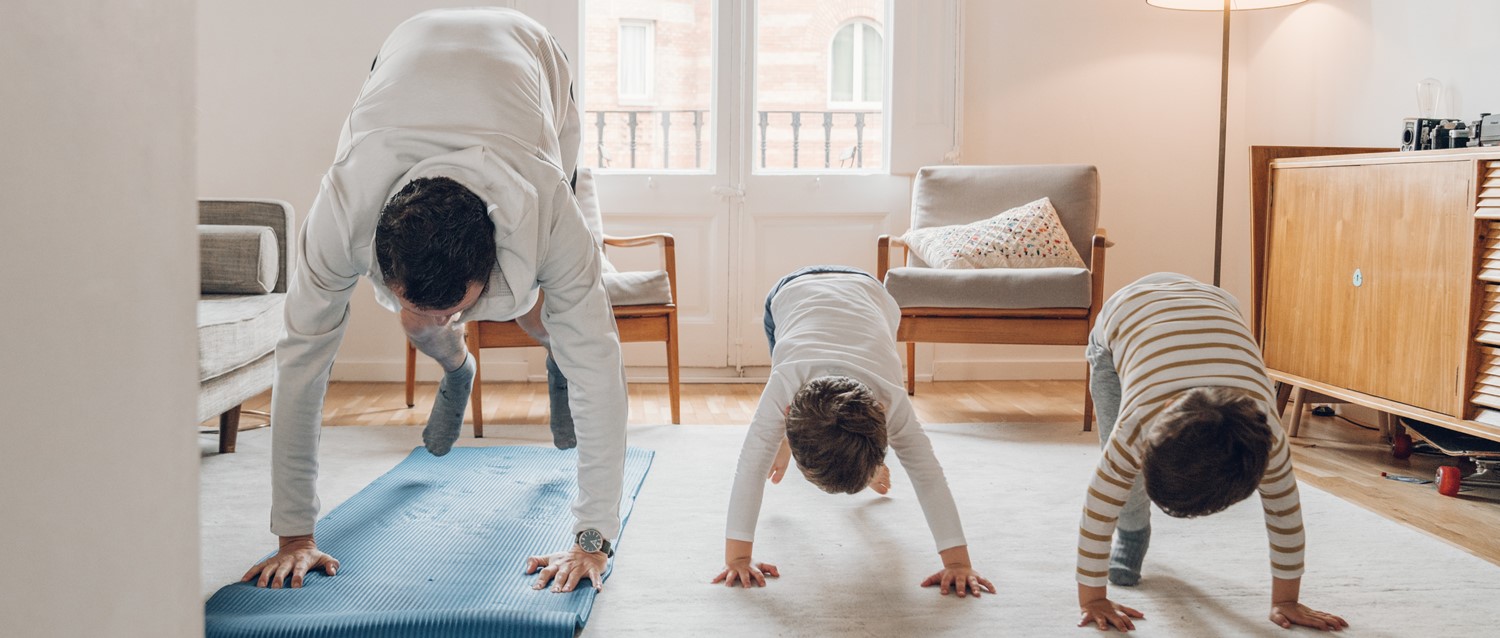
COVID-19: how to keep kids active during the coronavirus lockdown
Peer reviewed by Dr Sarah Jarvis MBE, FRCGPLast updated by Gillian HarveyLast updated 15 Apr 2020
Meets Patient’s editorial guidelines
- DownloadDownload
- Share
- Language
- Discussion
- Audio Version
Even though we're all stuck inside as a result of the coronavirus pandemic, there's no reason we should let COVID-19 stop us keeping fit. For children, making sure they can burn off energy and stay active is crucial for their well-being - and to stop them bouncing off the walls.
In this article:
Video picks for Pandemic articles
Use Patient's coronavirus checker tool if you have any symptoms of fever or a new cough. Until you have used the tool and been advised what action to take, please stay at home and avoid contact with other people.
When you're going through a difficult time, it can be hard to think about taking exercise - especially if you’re stuck indoors for most of the day. But for adults and children alike, keeping fit and working out can do wonders for both our physical and mental health.
"With so much uncertainty going on and everyone really anxious about the future, exercise is a fantastic way to decrease stress and take a break from everyday life," agrees Richard Goodman, who runs sports-inspired nanny agency Athlete Mannies.
But with play centres closed and parks out of bounds, how can we keep our kids, from toddlers to teenagers, active during isolation?
Continue reading below
What counts as a good workout?
If we're used to attending classes, or counting our laps of the park, how how can we measure whether exercise we're doing in our front room or back garden is enough to keep us fit?
"It's important to get aerobic exercise, which helps to reduce the risk of cardiovascular disease, diabetes type 2 and high blood pressure among many other health benefits," advises Hannah Murphy, Director of Globe Fit. "You should be aiming to reach 55-85% of your maximum heart rate, which you can calculate by using 220 minus your age."
If you'd rather not get too technical, any exercise that gets heart pumping and has you working up a sweat is probably ticking the right boxes.
"All movement is good," adds Goodman. "Running around having fun or putting the radio on to have a dance - it doesn't matter what you do as long as you do something."
Having a routine
Back to contentsSo, is it a good idea to set a time-slot for our kids' daily workout? Or should we be more flexible?
"It really depends on the child, and the other commitments you may have," explains Murphy. "Some children - particularly those with anxiety or special needs - may benefit from a routine. But it's not one-size-fits-all. Routines don't always fit with family life and work."
"It doesn't really matter when you choose to exercise," agrees Goodman. "Your exercise sessions need to be something you want to do, that you're going to have fun with. As long as it happens at some point, it doesn't really matter."
Continue reading below
Improvising
Back to contentsIf we're more used to lifting weights at the local gym, or jumping on trampolines at the leisure centre, it's hard to know what tools to use at home to enhance our workout. But this is where we can get creative - and encourage the kids to join in too.
"Hula hoops are cheap and don't take up a lot of room so they're a great thing to add to your workout," advises Murphy. "But really anything goes - you can fill up water bottles or use baked bean tins for weight resistance. Use the sofa to do push-ups. Get inventive with things around your home."
"Try things like boxing - which just needs pads or pillows and doesn't require a lot of space," suggests Goodman. "Jump rope skipping can be really motivational - especially if you team it with a YouTube video."
Many of us have also tried Joe Wicks' daily PE class on YouTube, and there are others to choose from too. "Key players from the fitness industry and even Olympic athletes are posting amazing workouts. They can be really influential role-models for kids," says Goodman.
Encouraging reluctant teens
Back to contentsAnyone with experience of parenting a teenager knows that it can sometimes be difficult to motivate a child of this age-group to try something new. Your teen may well be missing friends, or the routine of school or have other worries that also mean their motivation is low. But encouraging exercise is crucial for their health and well-being.
"To motivate kids of any age, the key is making it fun and engaging," says Murphy. "Asking them to do an hour-long class probably won't work. Try to stick to shorter bursts of 30 minutes. And it's got to be something they find fun. Pop dance workouts can be good - they don't always realise they're exercising! And try dancing along to videos on TikTok."
Kids who are used to playing football may be struggling without their teammates and the space of the football fields, but there are ways they can indulge their favourite pastime from the garden or living room. For example, "there's a 'keepy up' challenge currently on YouTube that your footballer could try," suggests Murphy.
For those who need additional motivation, see what their favourite celebrities are doing to keep fit during isolation.
Continue reading below
What if you're under the weather?
Back to contentsOf course, there may be days when, however motivated you are, you or your children don't feel up to working out. And it's important to listen to our bodies at these times.
"I always recommend paying attention to your health and well-being," advises Goodman. "If you're starting to feel mild symptoms try to continue to move, but keep things simple. Walk around the garden to get some fresh air and keep some light level of exercise if you can."
Patient picks for Pandemic articles

COVID-19
What are the school COVID rules October 2023?
As we enter the winter months, your child may be showing symptoms that make you wonder whether they can go to school. We explain the UK government's latest guidance on school COVID rules October 2023.
by Amberley Davis

COVID-19
COVID-19: is it safe to send your kids back to school?
The UK Government has scrapped its plan to get all children back to primary schools in England before the summer holidays. But as more parents return to work over the coming weeks as some shops and businesses open up, they are left with a difficult decision - is it safe for children to go back to school? We look at the science behind the headlines.
by Gillian Harvey
Continue reading below
Article history
The information on this page is peer reviewed by qualified clinicians.
15 Apr 2020 | Latest version

Ask, share, connect.
Browse discussions, ask questions, and share experiences across hundreds of health topics.

Feeling unwell?
Assess your symptoms online for free
Sign up to the Patient newsletter
Your weekly dose of clear, trustworthy health advice - written to help you feel informed, confident and in control.
By subscribing you accept our Privacy Policy. You can unsubscribe at any time. We never sell your data.